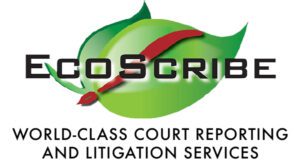
Depositions 101: Understanding the Key Elements
Depositions are vital to most litigation proceedings, providing information that is needed to build a successful case or outcome. Attorneys understand the importance of depositions and the accuracy of transcription, but anyone involved in a deposition should understand how these interviews are conducted. At EcoScribe, we have completed countless depositions for our clients, providing precise and accurate court reporting. We are the leaders in remote deposition technology, with over a decade of experience in this field. Here are the basics of depositions and the key elements of a successful outcome.
What Are Depositions?
Simply put, depositions are interviews used to gather information, usually for a legal case. This is a formal interview where one party is questioning a person of interest for a legal case or trial. Depositions can be performed in person, usually at an attorney’s office. They can also be performed remotely with online video conferencing or through a written document. Most remote depositions are attended by a court reporter or videographer to record the session, which is then transcribed by a court reporter into a written deposition document or transcription.
Depositions are usually taken before a trial and help to make court proceedings more efficient. The transcription can be reviewed by everyone involved to ensure all sides have the same information. The accuracy of the legal transcription services is crucial, which is why having a highly experienced court reporter is a valuable investment.
Key Components of Depositions
According to Rule 28 of the FRCP (Federal Rules of Civil Procedure), all depositions must be taken under oath. This means that an authorized officer must have the deponent take an oath of truthfulness before the deposition begins. The deponent is then questioned about relevant information about the case. The goal of depositions is to gather facts to strengthen a case or disprove theories about the case. The deposition can last anywhere from less than a half an hour up to seven hours. By law, depositions cannot last more than seven hours in one day. If more time is needed, another deposition will need to be scheduled to complete the questioning process.
Court Reporting Deposition Transcription
Once the deposition is complete, this is where the role of a highly-skilled court reporter comes into play. Every word spoken during the deposition must be transcribed exactly for legal accuracy. It may sound simple, but it is vital for the record to be completely accurate, not changed in any way, and impartial. Every question and answer must be recorded exactly – the transcription makes it easier to understand the information provided by the deponent. It requires expertise to record hours upon hours of testimony verbatim to create the legal transcription of the deposition – you want a court reporting service that has an excellent reputation for its precision and professionalism. Once completed, the transcription is available to both sides of the case to review. Deponents have up to 30 days to make changes to their statements in the deposition.
Nationwide Remote Depositions
At EcoScribe, we are leaders in providing precise and accurate deposition transcription for our clients throughout the world. We offer remote deposition transcription performed by our experienced and skilled court reporters. Whether you need a legal videographer and court reporter for an in-person deposition or assistance with a remote deposition, our team utilizes the most advanced technology to precisely record your deposition. EcoScribe has locations all over the country to give you access to world-class court reporting where you need it.
Contact us today to learn more about our nationwide court reporting firm and our wide assortment of litigation services.

